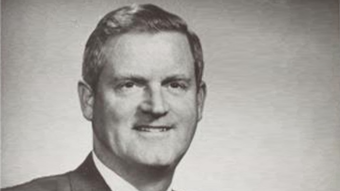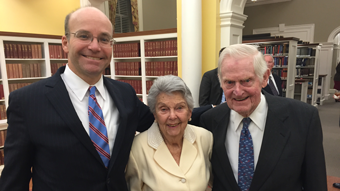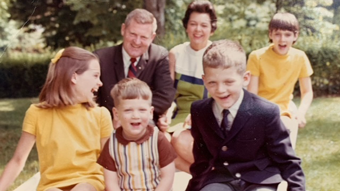In memoriam: A. Linwood Holton, Jr.
Former Virginia governor remembered for founding the Miller Center
Governor A. Linwood Holton, Jr., chairman emeritus of the Miller Center’s Governing Council, died on October 28 at the age of 98. Holton was governor of Virginia from 1970 to 1974 and was chair of the Republican Governors Association.

While serving as governor, Holton personally orchestrated negotiations between benefactor Burkett Miller and the University of Virginia, leading to the Center's official opening in September 1975.
Fittingly, Holton served as the Center’s Governing Council chairman from 1977 to 1999 and continued to serve until 2015, at which point he was named a lifetime member. He helped frame the Center's nonpartisan focus on federal public policy issues, including its expertise on the presidency. His preeminent leadership was honored by the creation of the Holton Society, which recognizes other longstanding Miller Center leaders who have dedicated their time and talent to support the work of the organization.
Winning the gubernatorial election in 1969, he became the first Republican governor of Virginia in exactly 100 years. His victory was attributed to support from President Richard Nixon, as well as a bitter primary among his opponents.
Holton won by assembling a winning coalition of the established Republican base and enough African American and white working-class voters to give him 52 percent of the ballots.
His dedication to racial equity received widespread attention during the struggles over school desegregation in the 1970s, as he sent his children to majority-Black Richmond public schools.
In his inaugural address, he declared that Massive Resistance, the state's anti-desegregation policy, had ended in Virginia: “The era of defiance is behind us,” he said, according to Encyclopedia Virginia. “Let our goal in Virginia be an aristocracy of ability, regardless of race, color, or creed."
Holton reorganized the executive branch, worked to clean Virginia’s polluted waters, and helped create a unified Port Authority in Hampton Roads. However, he saw increasing dissension among Republicans in the Commonwealth, and the party lost a series of statewide elections in the 1970s.
In 1974, Nixon appointed Holton to assistant secretary of state for congressional relations, making him the liaison between Secretary of State Henry Kissinger and the U.S. Congress during Nixon’s impeachment and resignation.
In 1975, Holton returned to private legal practice and then to government service in 1986, when the Reagan administration appointed him to chair the newly created Washington Metropolitan Airports Authority.

Holton also was a member of the government relations team for the Richmond, Virginia–based law firm of McCandlish Holton PC. He served as president of the Center for Innovative Technology, as vice president and general counsel of the American Council of Life Insurance, as a member of Amtrak's board of directors, and as chair of the Metropolitan Washington Airport.
He is survived by his wife, Jinks; his children Tayloe, Woody, Anne, and Dwight; and 10 grandchildren.
A REMEMBRANCE FROM BILL ANTHOLIS, Miller Center director
The country and the Commonwealth of Virginia have lost a great American with the passing of Linwood Holton.
No single individual has had as great an impact on the Miller Center as did Governor Holton. He helped secure the Center’s founding gift and served as chair of our Governing Council for two decades. During that time, he worked to craft the Center’s research mission and to establish the Miller Center as an essential forum for discussing pressing national issues. He helped forge a commitment to rigor and nonpartisanship and earned the respect and loyalty of a wide range of Americans, across the political spectrum.
He did so while setting a standard for clear-thinking, grace, and humor. His principled conservatism guided so many of his accomplishments as governor, most notably on civil rights. That same care for conservation through reform led to major Miller Center commissions on a wide range of topics, including presidential transitions, the role of the vice president, the conduct of presidential selection, and the separation of powers.
Governor Holton was instrumental in designing the Miller Center’s unique role at the University of Virginia, with an independent Governing Council and a special reporting relationship to UVA’s president. From time to time, Governor Holton would be called in to remind University officials of the importance of that independent voice.
On a personal level, I will greatly miss Governor Holton. I first met him in December 1992. His youngest son, Dwight, had returned to Washington after serving on the Clinton-Gore campaign and was about to join the White House as a junior staffer. He invited several campaign friends, including me, to a Christmas celebration at the Holton home.
The Holton family tradition was to read an abridged (but still lengthy) version of Charles Dickens’s A Christmas Carol. Seated in a large, over-stuffed arm chair—with two dozen people assembled in folding chairs or sitting on the floor around him—he held court, reading stave 1 in his deep, Southwest Virginia baritone: “Marley was dead, to begin with.”
There was a twinkle in the governor’s eye as he retold the tale of the first haunting of Ebenezer Scrooge by Jacob Marley. Following the presentation, a lesser voice would tackle stave 2—including, in one year's reading, a young Richmond civil rights lawyer, Tim Kaine, the governor's son-in-law. We took a break for lasagna, prepared by his wife, Jinks. An hour later, only the sturdiest readers and listeners made it to the end of stave 4, to hear Tiny Tim proclaim: “God bless us, everyone.”
For someone like me, new to Washington, joining this annual gathering was to enter into a very special world. Being lucky enough to be invited each year, I felt as though I had been welcomed into an anointed crowd. And yet the telling of that story—the humbling of a great and powerful man; the crestfallen ghost of a disappointed friend; salvation through compassion for an ailing child—spoke volumes about the values of the Holton family.
I personally came to hold in high regard the governor’s wisdom on a wide range of topics—from national politics to the work of the Miller Center. Though he retired from our Governing Council in my first year as director, we welcomed him back for a special holiday celebration where, once again, he read stave 1 of A Christmas Carol.
When one thinks back on all that Governor Holton achieved in his career of public service—civil rights, education, governance reform, rigorous research, civil discourse—and all that he accomplished through his family and four extraordinary children, one can’t help but think that he was the anti-Scrooge.
On behalf of the Miller Center, our deepest condolences to Jinks Holton and the entire Holton family. I am certain that his memory will be a blessing to all of them, as it will be for all of us.
